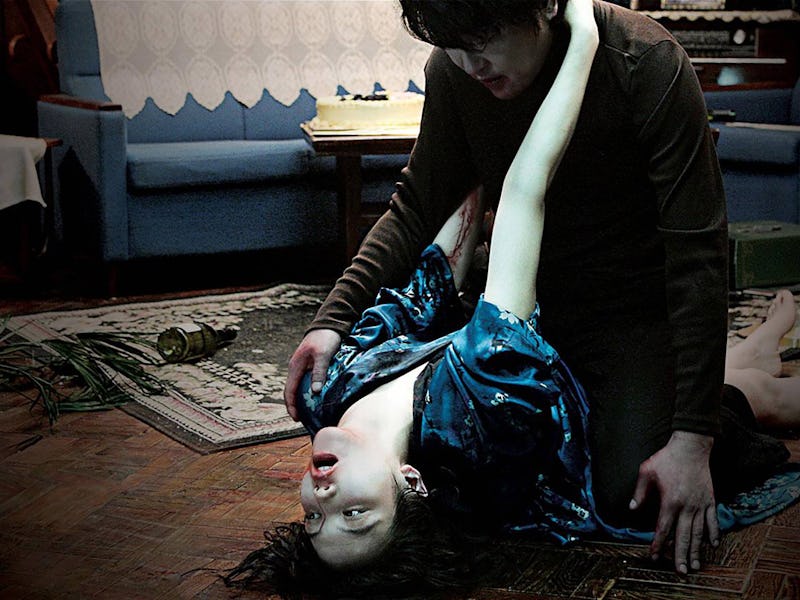Park Chan-wook Gave the New Korean Wave Its Great Vampire Movie
15 years later, Thirst remains disturbing, gruesome, and oh so sexy.

In the late 1990s, South Korean cinema experienced a major critical and commercial resurgence. Following the end of government restrictions on local and international cinema, a new generation of filmmakers emerged with narratives that explored the nation’s prickly past and pushed against the boundaries with intense portrayals of sex, violence, and humanity’s propensity for evil. The Korean New Wave, as it came to be known, broke through with international audiences, who were stunned and often shocked by these bold and oft-disturbing films that made Hollywood’s R-rated efforts seem like child’s play. At the heart of this movement was Park Chan-wook, whose Vengeance Trilogy included the now-iconic Oldboy.
Park was heralded by the likes of Quentin Tarantino for his bold genre-blending works that contained moments of pitch-black humor, merciless violence, and kinetic cinematography. It only made sense that he would also give this new generation of Korean cinema its greatest vampire movie.
In Thirst, Sang-hyun (Song Kang-ho, best known for Parasite) is a Catholic priest whose crisis of faith leads him to volunteer for a medical experiment in Africa. He dies but then makes a rapid recovery, leading many to see him as a messiah figure. He's actually now a vampire, and his turmoil over his transformation leads him into the arms of Tae-ju (Kim Ok-bin), the beleaguered wife of his childhood friend and a woman whose own untapped desires are begging for carnal release.
Released in 2009, Thirst is a horror-comedy-romance-erotica-satire-tragedy loosely inspired by the classic French novel Thérèse Raquin. If that sounds like a lot, it's because Thirst is indeed a lot, much in the same way that Park's more famous films are crammed to the brim with styles, ideas, and genres. As expected for a Park film, Thirst pushes the boundaries. It was the first mainstream Korean film to feature full-frontal adult male nudity. The violence is intense and gut-churning, as shown in one scene where a fishing hook rips through a woman’s earlobe. The most shocking moments are blended with humor so dark that you’re not sure whether to laugh or cry. And at its heart is a love story so unbearably illicit and doomed that it puts Greek tragedy to shame.
Kim Ok-bin’s performance as the turmoiled wife turned bloodthirsty vampire is one of the all-time great villain turns of the genre.
It's tough to put a new spin on the vampire genre. It’s been around for so long and evolved with the times, often reflecting the concerns and desires of its era. Vampirism can be a metaphor for pretty much anything: sex, death, politics, faith, infection, and so on. Thirst covers a lot of classic vampire areas, like forbidden love, fear of damnation, and loss of humanity. As Tae-ju becomes embroiled in an affair with Sang-hyun, he fears for her innocence, but it soon becomes clear that her seething bitterness over her terrible life has made her a volatile candidate for vampirism. A man of God tries to find peaceful solutions to his murderous nature. A woman broken down by male stupidity and patriarchal glee chooses chaos, inflicting torture upon her mother-in-law and giddily viewing all humans around her as food.
Sang-hyun becomes obsessively lustful upon meeting Tae-ju, a contrast from his celibate nature as a priest (fittingly for the guy who made The Handmaiden, Park makes sure Song and Kim’s on-screen chemistry is off the charts.) As he sinks into further deviance and sin, he views his undead nature as the cause of his newfound selfishness. For Park, however, vampirism isn’t a transforming force so much as a revealing one. Being a vampire awakens unexpectedly forceful feelings in our characters, but they’re not necessarily surprising ones. Of course Sang-hyun would be uncontrollably horny after decades of no sex, while Tae-ju lashes out at those who made her life a misery.
Hollywood might have been done with the vampire movie, but Thirst showed that there was plenty more mileage to be made out of the genre.
While not as grandiose in its tragedy as Oldboy, Thirst is still inimitably Park in how it shows the near-biblical levels of pain that befall a man who has spent his life trying to be selfless. Volunteering for a worthy cause gets him killed and revived. Trying to help Tae-ju ends in murder. No matter how much he tries to be a man of the cloth, his basest instincts demand attention. His one truly selfish deed, turning Tae-ju into a vampire, is done because the idea of eternity alone with only God to judge him is too unbearable to accept. And that’s a decision he almost immediately regrets.
Thirst feels like the more melancholy flipside of Oldboy, the romantic tragedy of the Korean New Wave that is just as sick, twisted, and bleakly hilarious as its bloodiest endeavors. Where Oldboy revealed how revenge is almost always destined to fail, Thirst shows how shame smothers us and mutates basic human kindness into something familiarly painful. Hollywood may have been giving up on the vampire trend by the time that Park released his version of the lore, but Thirst reminds us that the classic creatures never truly die: they just find new ways to survive beyond the mainstream.